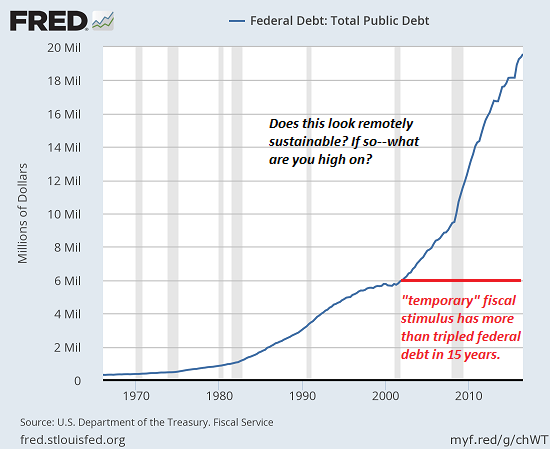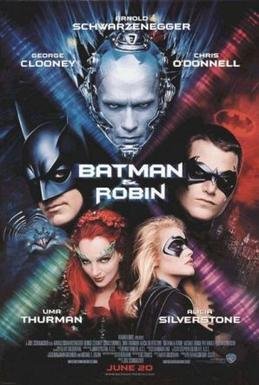What's The Safest Investment In Troubled Times?
Authored by Charles Hugh Smith via OfTwoMinds blog,
An investment that can be gutted by financial rules changing overnight is not safe.
What's the safest investment as the global economy enters increasingly risky, troubled times? I've reviewed hundreds of academic papers, investment reports and newsletters and researched long-term strategies and backtests and reached one conclusion.
I won't keep you in suspense: it's bat guano (or seabird guano if you can't get the bat stuff). Yes, bat doo-doo is the safest single investment on the planet.
OK, so I didn't do a lot of fancy research because that would have been a waste of time. If the era we're entering is fundamentally unlike the previous eras, then studying past investment results and strategies will generate dangerously misleading conclusions.
Here's the thinking that leads to bat guano being the number one Safest Investment.
1. The safest investment must have permanent, substantial demand supporting the bid. People need to eat, and nowadays that means having access to high-quality, organic fertilizers like bat and seabird guano.
No matter what happens in the global economy, people will still need to eat and they will need fertilizer to grow enough food to avoid mass starvation. People will trade oil, gold, whatever they have of value for food, and while everybody knows about fresh water, good soil and oil to run the tractors and delivery vehicles, the essential role of wide-spectrum fertilizers is often unappreciated.
2. There can't be super-cheap substitutes that are extracted/manufactured everywhere. You can get the various components of fertilizer from other sources, but bat/seabird guano is an excellent source of Nitrogen, Phosphorous, and Potash (Potassium), the essential N-P-K of fertilizers.
The sources for P and K are not all that abundant. In my view, there are no readily available dirt-cheap substitutes for bat guano.
3. An investment that can be gutted by financial rules changing overnight is not safe. If there's one thing we know about real financial crises, it's that the rules will change overnight, and keep on changing.
You thought the money in your bank account was yours? Silly you! The rules changed and the bank bailed-in your dough--at the behest of your wunnerful government.
You thought your retirement funds were safe? Silly you! The rules changed overnight and "for your own safety" (heh) your retirement funds were invested in negative interest rate government bonds.
Want to sell your stock ETFs before the market falls any further? Silly you! The market is closed until things stabilize.
And so on. Now the government can expropriate your bat guano along with all your other wealth, but being a physical asset, it isn't all that cheap or easy for the government to control what happens to your bat guano--especially if it's overseas.
What the government loves is financial assets that must flow through chokepoints the government can control--like banking. These assets are very easy to expropriate/tax/control.
This is why governments fear bitcoin and cryptocurrencies, and why they want to corral cryptocurrencies into the banking system where they can control it all and change the rules with a few keystrokes.
But the governments of the world face a problem when it comes to bitcoin et al.--they aren't centralized like all the other financial assets. The government can track that you bought bitcoin (BTC) with some of your dollars, but once you distribute your BTC into a handful of encrypted thumb-drives (USB memory sticks), they can't keep track of your BTC.
If they demand to know where you BTC are, you report that you lost them, as they were on a thumb-drive that fell out of your pocket. Bad luck, and all that.
Meanwhile, you slip the handful of USB drives into packages of books, artwork, etc. for delivery to trusted folks overseas. This movement of assets is impossible to track, as it flows through vast pipes of physical commerce with tens of thousands of nodes (local post offices, UPS and FedEX offices and vehicles, etc.)
Maybe an enterprising government will scan every letter, package and box, or require the shippers to perform the scan, and such scans could certainly detect gold doubloons in a package, but a USB drive? It's small and mostly plastic.
And even if some super-duper scan could detect a thumb drive, what's the state going to do, open every package with a USB drive and attempt to break the drive's encryption? That is non-trivial, and some believe (based on various leaks) that even the NSA can't break pretty good encryption--and it certainly can't check thousands of thumb drives to see if they might have some bitcoin in their innards.
Searching for bitcoin on thumb drives in tens of thousands of letters and packages is a lot more difficult and costly than announcing a bank bail-in or imposing a wealth tax on all those scoundrels with more than $10,000 in their retirement accounts. (Yes, you're obviously too rich for your own good, and we're fixing that tomorrow--the rules change tonight.)
4. An asset valued by virtue of a crowded trade is not safe. Right now, to take one example of many, the consensus is that inflation is not just dormant but essentially impossible in a deflationary world. As a result, the consensus is anticipating not just low interest rates and bond yields, but declining rates and yields should the global economy cool off/slow.
That's a very crowded trade. Crowded trades aren't safe, because when every punter is on the same side of the boat, the boat is destabilized. It doesn't take much to tip the boat over. Also, Mr. Market usually doesn't reward everyone in a crowded trade for long.
Here's a crowded trade: all that super-safe Treasury debt. The gummit/central bank can't go broke because it can always print more currency. That's the acme of safety, or so we're told. Nobody mentions that the gummit/central bank can also debauch its currency in the process of maintaining the illusion of solvency:

It doesn't seem that bat guano qualifies as a crowded trade, at least not yet.
So go ahead and laugh, but the owners of caves loaded with bat guano and islands covered in seabird guano might have the last laugh.

Disclaimer : This is not the real Tyler Durden. I read ZeroHedge every day and share the best articles about cryptocurrencies, politics and economy on Steem. You can head over to ZeroHedge's website for more content.
So does anyone have any ideas for publicly traded bat-guano companies?
So your telling me that bat shit is the best place to put my money?
bat guano
There is one problem whit quano.
It expires pretty fast.
Can you tell me which one? The one from carnivore bats or herbivore bats ?
There is a chemical difference the carnivore is for plants whit fruits and the herbivore is for vegetative state and for plants whit no fruits.
PS: you should see my tomatoes !
Sorry I find this article to be inaccurate advice. My response https://steemit.com/news/@immetal6669/what-is-the-safest-asset-in-troubled-times-sorry-zerohedge-it-s-not-bat-gauno
Great input!
Thanks man!
Harvesting bat guano is dangerous for the environment those bats never come back once their home is destroyed. I've heard salt is the safest alternative asset. As a former professional medical marijuana grower where growers love bat guano. I've grown strong, healthy and productive plants without ever touching bat or seabird Guano
If you really think another great war is coming stock up on sugar, when every other luxury is gone and rationing (but for a MUCH bigger population comes in) it's back to black market basics...
The stuff is really expensive and excellent for growing medical marijuana too. I can see why it would be a good investment!
Bat guano is way overrated for medical, you really don't need it and shouldn't because of the environmental impact
Just curious, how would it impact the environment?
When you remove the Gauno from the caves the bats flee and never return displacing them from a home. Bats are a crucial part of the eco system.
following!
Food and water is always the safest investment. Nothing can compare to that. This is the only investment that one truly needs. Thank you for sharing this post/article.
Love the Zer0Hedge site. Great site
Buy Steem!
Does this count as Guano?
